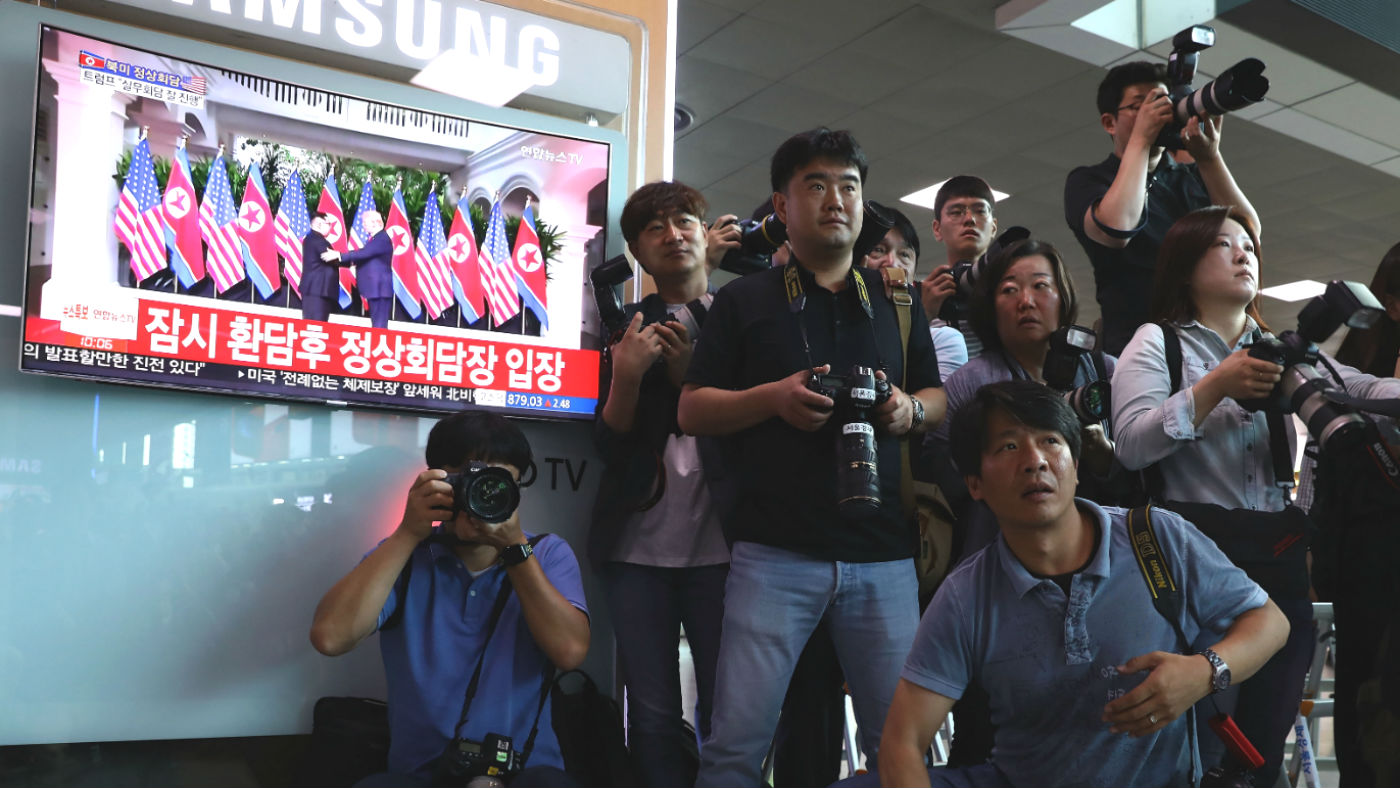Why Kim Jong Un brought his own toilet to Singapore - and other weird summit facts
The two leaders sat down to a lunch of short rib, octopus and Häagen-Dazs

A free daily email with the biggest news stories of the day – and the best features from TheWeek.com
You are now subscribed
Your newsletter sign-up was successful
The historic summit between US president Donald Trump and North Korean leader Kim Jong Un is being hailed as the biggest diplomatic breakthrough in a generation.
But behind the headlines lies a myriad of weird details - and here are a few surreal moments from a truly unprecedented day:
Kim brought his own toilet
The Week
Escape your echo chamber. Get the facts behind the news, plus analysis from multiple perspectives.

Sign up for The Week's Free Newsletters
From our morning news briefing to a weekly Good News Newsletter, get the best of The Week delivered directly to your inbox.
From our morning news briefing to a weekly Good News Newsletter, get the best of The Week delivered directly to your inbox.
Although Kim’s suite at the five-star St Regis hotel in Singapore came with a luxurious ensuite bathroom, the North Korean leader will only be relieving himself in a portable loo brought from home.
This is not the first time Kim has taken such a precaution. The armoured car which brought him to his milestone meeting with South Korean president Moon Jae-in April has its own toilet, and he reportedly brings one with him even on travels within North Korea.
The practice “allegedly stems from Mr Kim's fear that foreign agents will look at his stools to gain an insight into his secretive life”, The Independent reports, potentially uncovering health problems which rival states could use to their advantage.
The almost total absence of concrete information about Kim’s health or personal life is also “a useful negotiating factor”, says Slate: “Kim knows more about the publicity-loving U.S. president than Trump knows about him”.
A free daily email with the biggest news stories of the day – and the best features from TheWeek.com
Kim greeted Trump in English (maybe)
Initial reports suggested that Kim’s first words to Trump were “Nice to meet you, Mr President”, as the two shook hands outside Singapore’s Capella hotel ahead of their summit.
“However, others put forth doubts about the claim, suggesting that those words had actually come from the interpreter,” says the Korea Herald.
Kim is thought to have spent part of his education at an international school in Switzerland, where he would have been taught in English. However, both leaders were accompanied by their interpreters throughout their talks.
The leaders ate Häagen-Dazs at lunch
The menu at the lunch organised for the US and North Korean delegations was, as you might have expected, an East-West fusion, with prawn cocktail and beef short rib nestling up against stuffed cucumber and sweet and sour pork.
The inclusion of Häagen-Dazs on an otherwise brand-free menu had some wondering if the ice cream firm had brokered a highly unlikely sponsorship deal:
The meeting made Dennis Rodman cry
Former US basketball star Dennis Rodman has been a peripheral figure in the US-North Korea conflict, after striking up an unlikely friendship with Kim in 2013 while hosting exhibition matches in Pyongyang.
Long an advocate of dialogue with the dictator, Rodman’s vision came true as Trump and Kim shook hands and signed a joint statement on Tuesday.
Wearing one of the red Make America Great Again baseball caps sported by Trump fans, Rodman wept during an emotionally-charged interviewed on CNN.
“I knew things were gonna change,” he said, recounting how he had received death threats over his friendship with Kim. “It’s a great day. I am here to see it. I'm so happy.”
-
 The environmental cost of GLP-1s
The environmental cost of GLP-1sThe explainer Producing the drugs is a dirty process
-
 Greenland’s capital becomes ground zero for the country’s diplomatic straits
Greenland’s capital becomes ground zero for the country’s diplomatic straitsIN THE SPOTLIGHT A flurry of new consular activity in Nuuk shows how important Greenland has become to Europeans’ anxiety about American imperialism
-
 ‘This is something that happens all too often’
‘This is something that happens all too often’Instant Opinion Opinion, comment and editorials of the day
-
 Greenland’s capital becomes ground zero for the country’s diplomatic straits
Greenland’s capital becomes ground zero for the country’s diplomatic straitsIN THE SPOTLIGHT A flurry of new consular activity in Nuuk shows how important Greenland has become to Europeans’ anxiety about American imperialism
-
 Epstein files topple law CEO, roil UK government
Epstein files topple law CEO, roil UK governmentSpeed Read Peter Mandelson, Britain’s former ambassador to the US, is caught up in the scandal
-
 Iran and US prepare to meet after skirmishes
Iran and US prepare to meet after skirmishesSpeed Read The incident comes amid heightened tensions in the Middle East
-
 Which way will Trump go on Iran?
Which way will Trump go on Iran?Today’s Big Question Diplomatic talks set to be held in Turkey on Friday, but failure to reach an agreement could have ‘terrible’ global ramifications
-
 Israel retrieves final hostage’s body from Gaza
Israel retrieves final hostage’s body from GazaSpeed Read The 24-year-old police officer was killed during the initial Hamas attack
-
 China’s Xi targets top general in growing purge
China’s Xi targets top general in growing purgeSpeed Read Zhang Youxia is being investigated over ‘grave violations’ of the law
-
 Ukraine, US and Russia: do rare trilateral talks mean peace is possible?
Ukraine, US and Russia: do rare trilateral talks mean peace is possible?Rush to meet signals potential agreement but scepticism of Russian motives remain
-
 Panama and Canada are negotiating over a crucial copper mine
Panama and Canada are negotiating over a crucial copper mineIn the Spotlight Panama is set to make a final decision on the mine this summer